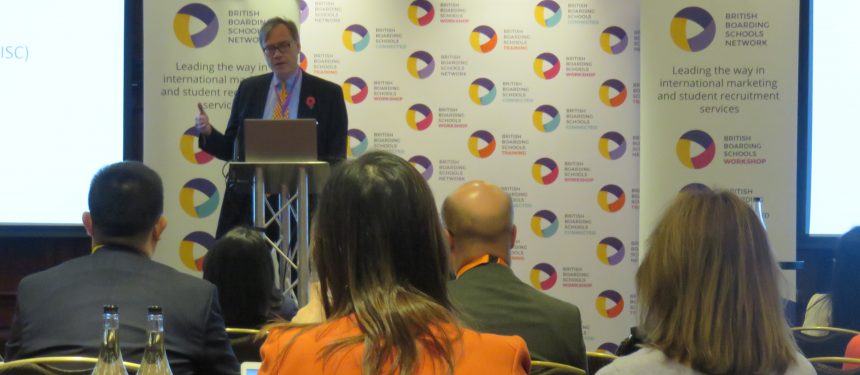The number of non-British pupils with parents living overseas studying at UK boarding schools this year was down by around 470, according to figures from the Independent Schools Council. However, Suzanne Rowse, director at the British Boarding Schools Network, has told The PIE News there are reasons to be optimistic for future intakes.
News and business analysis for Professionals in International Education
Have some pie!
Upbeat outlook for enrolment at UK boarding schools
 Barnaby Lenon from ISC talked of the advantages of UK-based education compared with studying a Western curriculum overseas. Photo: The PIE News
Barnaby Lenon from ISC talked of the advantages of UK-based education compared with studying a Western curriculum overseas. Photo: The PIE News Global oil crises, shrinking wealth, falling birth rates in Asia, visa regulations, and students choosing foundation courses over boarding schools, all contributed to reduced enrolment from overseas pupils in 2016/17.
Nineteen key markets in British boarding schools have dropped since last year’s ISC figures, including Russia, down 20.5%; Nigeria down 30.9%; and Central & South America, down 19.7%.
This information was delivered by the British Boarding Schools Network’s market analysis at its recent workshop in London. Enrolments from mainland China remain stable, having increased in recent years.
But Rowse explained that a competitive currency is buoying demand in Europe.
“In Spain, France, Germany and Italy, the weaker pound is helping recruitment to grow. The slow [Brexit] negotiations has reduced the Brexit effect, especially for those looking for short-term placements,” she told The PIE News.
Even boarding school recruitment in Russia, which has been significantly impacted with political issues and the rouble devaluation in the past two years, is now looking promising, she related.
The unstable political situation in Turkey has resulted in growing demand for a British education from Turkish parents
“Agents are reporting more applicants this term for entry in September 2018,” she said. “One agent who recruits from Russia said that schools are reporting two or three times more applicants already this term.”
She added Turkish agents had told her that the unstable political situation in Turkey has resulted in growing demand for a British education from Turkish parents wanting to send their children abroad.
Nigeria saw enrolments fall in 2017, following difficulties transferring funds abroad that the Nigerian government deemed non-essential, and challenges remain.
But in February, the Central Bank of Nigeria announced an important revision to its fiscal policy, making the payment of overseas school fees one of the country’s priorities.
“So whilst there is now no obstacle to pay school fees, agents report that many parents simply don’t have the money due to deflated oil prices, hence recruitment is still slow from this key African market,” explained Rowse.
Independent schools abroad are also competing in many cases to attract the same potential students.
Barnaby Lenon, chairman of the Independent Schools Council, spoke of the added benefits of studying in the UK:
As a student, “you are going to probably find it’ll be easier to learn English, you’re going to learn about British culture, and you’re going to find it’s a lot more straightforward to enter into British universities because you’re closer to the game,” he stated.
Lenon thinks that issues surrounding visas will become less of a challenge in the future.
“We are seeing more schools offering short term stays for 6 weeks or a term taster experience”
“I think that everybody in government understands that students who come to British boarding schools and to British universities … are welcome, they are very important for some of our universities,” he said.
“All of our universities take quite large numbers from overseas and very few of those students turn out to be a problem for the visa authorities.
“There is every likelihood that, as part of the Brexit arrangements, the government will announce a liberalisation of the visa regime as far as international students are concerned.”
The PIE News reported that an increase in demand for foundation courses that prepare for university were also creating competition in 2015.
Rowse is adamant that schools need to be flexible and adaptable to meet the requirements of markets. They must be open to compromise on deposits and continue to have good partnerships with agents.
“We are also seeing more schools offering short term stays for 6 weeks or a term taster experiences with a financial incentive to return for a longer term academic programmes,” she said.
She added that Bromsgrove School in the Midlands is introducing a one year Foundation Programme from next year; a new trend in the sector.
Still looking? Find by category:


